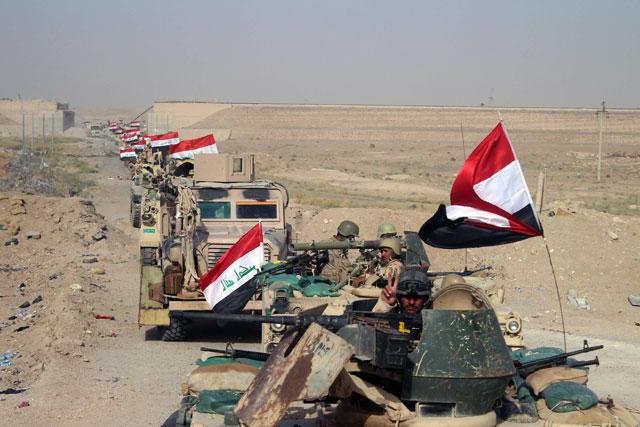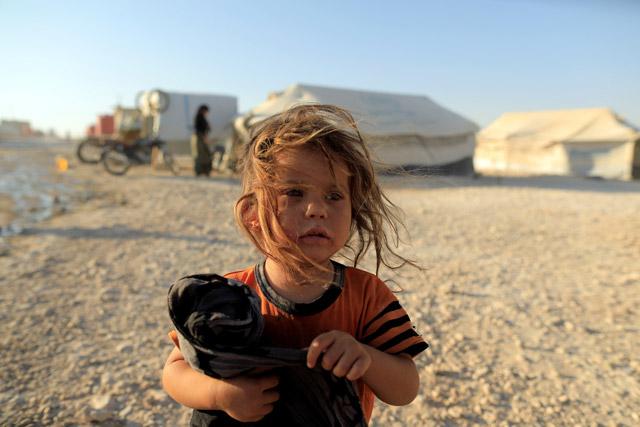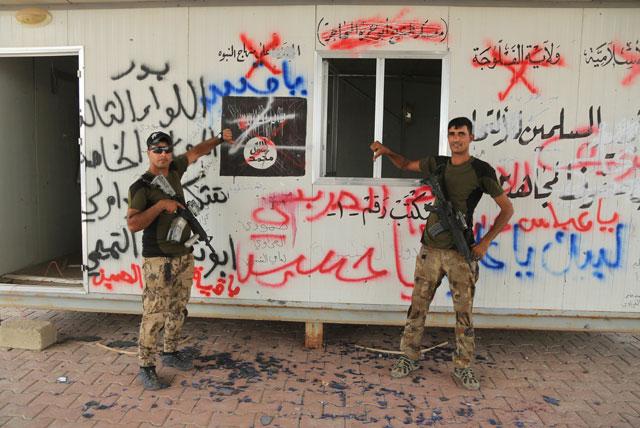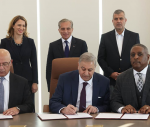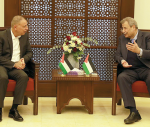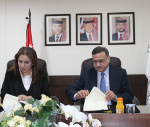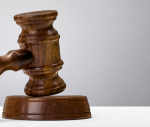You are here
Battle for Fallujah will end in western district, says Iraqi commander
By Reuters - Jun 20,2016 - Last updated at Jun 20,2016
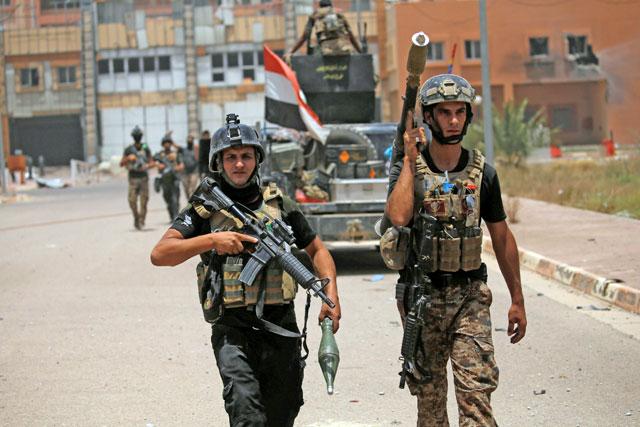
Iraqi security forces walk with their weapons at Fallujah hospital in the centre of Fallujah, Iraq, on Monday (Reuters photo)
FALLUJAH — US-backed Iraqi forces fighting Daesh militants in Fallujah are advancing towards extremists’ strongholds in western districts where they expect the final push to recapture the city will take place, the Iraqi commander said on Monday.
Prime Minister Haider Al Abadi declared victory on Friday after troops reached the centre of the city, an hour’s drive west of Baghdad, but an official in the US-led coalition said on Sunday Iraqi forces had so far taken only half of Fallujah.
The operation to recapture the Iraqi city longest held by the Daesh terror group entered its fifth week on Monday, and fighting has forced more than 85,000 residents to flee to overwhelmed government-run camps.
Iraqi forces continue to face shooting, suicide bombs and mortar attacks as they confront militants north of a road running through the city.
Heavily armoured interior ministry police units were pressing towards Golan neighbourhood, on the northwestern edge of the city, Lieutenant General Abdul Wahab Al Saidi told Reuters at his temporary command post in a southern district.
“The biggest effort now is on the western axis. If they collapse on the western axis and our forces reach Golan, you won’t hear any more shots inside Fallujah,” he said.
Troops from Saidi’s counter-terrorism force were fighting Daesh in Al Dhubat district, further east. Fifty militants were killed there by coalition air strikes on Sunday and at least 15 others died in clashes, the commander said.
Army troops moving north from the neighbourhood of Shurta had not yet entered Al Jughaifi area on the city’s northern edge, while units from Baghdad operations command were advancing in the easternmost district of Askari, according to Saidi.
Sitting with other officers from the elite counter-terrorism service at a plastic picnic table littered with walkie-talkies inside an unfinished building, Saidi said the battle would end soon.
Most of the militants, including a few hundred foreign fighters, were killed or captured trying to escape with civilians, he said. Only six counter-terrorism commandos had been killed.
Government troops launched the operation on May 23 to retake Fallujah, a bastion of the Sunni Muslim insurgency against US forces that toppled Saddam Hussein, a Sunni, in 2003, and later against Shiite-led governments.
Enemies of Daesh have launched major offensives against the militants on other fronts, including a push by US-backed forces against the city of Manbij in northern Syria.
They amount to the most sustained pressure on Daesh since it proclaimed a religious caliphate in 2014.
Main hospital cleared
In battle-scarred Fallujah, which has witnessed more than a decade of violence — between Al Qaeda and US forces and later Iraq’s own security forces — it is hard to tell how much of the visible damage has been caused by the latest fighting.
Along the route from Saidi’s outpost into the city centre lie the remnants of vehicle-borne suicide bombs dispatched recently by Daesh, Al Qaeda’s successor. Brown scraps of metal dot the barren roadside.
The latest round of fighting, though, seems to have taken a lighter toll than previous campaigns, including the battle to retake Ramadi, the city 50km further west recaptured six months ago.
Falluja has incurred fewer air strikes and Iraqi forces’ quick advance to the city centre last week suggested the roads were less plagued by Daesh mines.
Saidi estimated damage to the city’s infrastructure at less than 5 per cent, which Reuters could not verify. Most houses have not yet been checked for explosives, a process that will delay the return of residents.
Government forces said on Monday the main hospital, a stronghold of militants which they surrounded a day earlier, had been partially burnt but was not booby-trapped and was not sheltering suicide bombers as initially suspected.
Police checking the complex found little other than an unidentified body and the buried corpse of a Daesh militant.
Saidi issued a ban over his walkie-talkie against anyone re-entering the hospital, in an apparent attempt to prevent looting by undisciplined security elements.
Down a road littered with the detritus of urban warfare, a main mosque topped with azure domes, was mostly untouched. A soldier urged visiting journalists to stick to the middle of the street to avoid setting off roadside bombs.
Related Articles
FALLUJAH, Iraq — Iraq's army sought on Monday to eliminate Daesh militants holed up in farmland west of Fallujah to keep them from launching
RAQQA, Syria — US-backed forces now have the Daesh terror group militants surrounded in central Raqqa, a Syrian Kurdish commander said, but
FALLUJAH — A highway overpass in central Fallujah, from which the Daesh terror group militants hanged a captured Iraqi soldier last year, be


